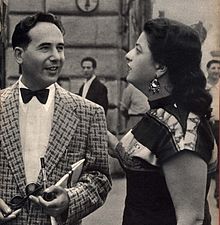
Quick Facts
Biography
Yehiel De-Nur, Dinoor or Dinur ('De-Nur' means 'of the fire' in Aramaic), also known by his pen name Ka-Tsetnik 135633, born Yehiel Feiner (16 May 1909 – 17 July 2001), was a Jewish writer and Holocaust survivor, whose books were inspired by his time as a prisoner in the Auschwitz concentration camp. His work, written in Hebrew, tends to "blur the line between fantasy and actual events" and consists of "often lurid novel-memoirs, works that shock the reader with grotesque scenes of torture, perverse sexuality, and cannibalism".
Early life
Yehiel De-Nur was born in Sosnowiec, Poland. He was a yeshiva pupil in Lublin and later supported Zionism. In 1931 he published a book of Yiddish poetry which he tried to destroy after the war.
Writings at Auschwitz, Eichmann trial
During World War II De-Nur spent two years as a prisoner in Auschwitz. In 1945, he moved to British-mandate Palestine (later Israel) and became a writer-historian survivor who wrote several works in Hebrew, which stemmed from his experience in the camp, under the identity he had been given by the guards at Auschwitz: Ka-Tsetnik 135633 (sometimes listed as "K. Tzetnik"). Ka-Tsetnik means "Concentration Camper" in Yiddish (deriving from "ka tzet", the pronunciation of KZ, the abbreviation for Konzentrationslager); 135633 was De-Nur's concentration camp number. He also used the name Karl Zetinski (Karol Cetinsky, again the derivation from "KZ") as a refugee, hence the confusion over his 'real' name when his works were first published.
He wrote his first book about the Auschwitz experience, Salamandra, over two and a half weeks, while in a British army hospital in Italy in 1945. The original manuscript was in Yiddish, but it was published in 1946 in Hebrew in edited form.
His civic identity was revealed when he testified at the Eichmann Trial on 7 June 1961. After a rambling opening statement in which De-Nur described Auschwitz as the "planet of the ashes", he collapsed and gave no further testimony.
In an interview on 60 Minutes, aired 6 February 1983, De-Nur recounted the incident of his fainting at the Eichmann trial to host Mike Wallace.
Was Dinur overcome by hatred? Fear? Horrid memories? No; it was none of these. Rather, as Dinur explained to Wallace, all at once he realized Eichmann was not the god-like army officer who had sent so many to their deaths. This Eichmann was an ordinary man. "I was afraid about myself," said Dinur. "... I saw that I am capable to do this. I am ... exactly like he."
House of Dolls
Among his most famous works was 1955's The House of Dolls, which described the "Joy Division", an alleged Nazi system keeping Jewish women as sex slaves in concentration camps. He suggests that the subject of the book was his younger sister, who did not survive the Holocaust.
While De-Nur's books are still a part of the high-school curriculum, Na'ama Shik, a researcher at Yad Vashem, The Holocaust Martyrs' and Heroes' Remembrance Authority in Israel, has claimed that The House of Dolls is pornographic fiction, not least because sexual relations with Jews were strictly forbidden to all Aryan citizens of Nazi Germany.
In addition, Tom Segev has suggested that De-Nur did not have a sister.
The British rock band Joy Division derived its name from this book, which was quoted in their song "No Love Lost".
Its publication is at times pointed to as the inspiration behind the Nazi exploitation genre of serialized cheap paperbacks, known in Israel as Stalag fiction. Their publisher later acknowledged the Eichmann trial as the motive behind the series.
Lavie Tidhar's 2014 novel, A Man Lies Dreaming, corresponds with De-Nur's work and his writing. De-Nur appears briefly as a character, in a fictional conversation (in Auschwitz) with author Primo Levi, whose subject is itself the question of how to write the Holocaust, and the novel concludes with a quote from Ka-Tzetnik on the nature of evil.
In De-Nur's 1961 book Piepel, about Nazi sexual abuse of young boys, he suggests the subject of this book was his younger brother, who also died in a concentration camp.
Personal life

De-Nur was married to Nina De-Nur, the daughter of Prof. Yossef (Gustav) Asherman, a noted Tel Aviv gynecologist. She served in the British Army as a young woman. Nina sought him out after reading his book Salamandra and eventually they were married. She was instrumental in the translation and publication of many of his books. They had two children, a son (Lior) and a daughter (Daniella), named after his sister Daniella from "House of Dolls", both still living in Israel. She trained with Virginia Satir in the 1970s. Later in life, Nina changed her name to Eli-Yah De-Nur.
In 1976, because of recurring nightmares and depression, De-Nur subjected himself to a form of psychedelic psychotherapy promoted by Dutch psychiatrist Jan Bastiaans expressly for concentration camp survivors. The treatment included the use of the hallucinogen LSD, and the visions experienced during this therapy became the basis for his book, Shivitti. The book's title is derived from David's Psalm 16, "תהילים טז: "שיויתי ה' לנגדי תמיד, more accurately translated in Acts 2:25: "I saw the Lord always before me", or "I was always beholding the Lord in my presence".
Yehiel De-nur died in Tel Aviv on 17 July 2001.

 Taurus
Taurus